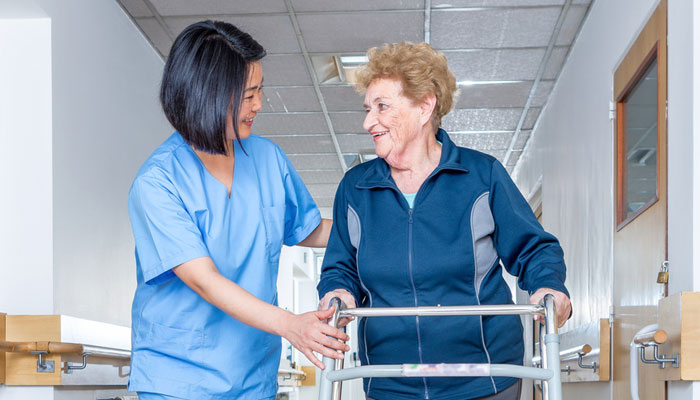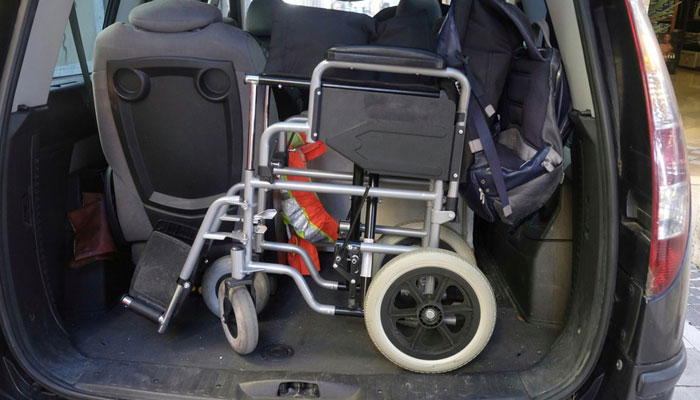Learn more at TriangleAgingAdvocate.com
Your Aging Advocate
Helpful tips for family caregivers
February/March 2018 Print
Family members have a greater ability to impact the outcomes in an elder care situation than they might initially expect. Our monthly newsletter for families focuses on giving you tips, information and skills to help you help your loved one maintain maximum independence and well-being. Whether you are dealing with hospitalizations, the logistics of a wheelchair, or struggling with your feelings about your caregiving role, we have resources to help.
Walking out of the hospital
 “The bed is not your friend.” This is the overall message concerning the benefits of walking when hospitalized. In one study, patients who walked frequently were able to go home an average of 36 hours earlier than those who did not walk very much.
“The bed is not your friend.” This is the overall message concerning the benefits of walking when hospitalized. In one study, patients who walked frequently were able to go home an average of 36 hours earlier than those who did not walk very much.
After staying in bed for just two days, an older adult begins to lose muscle mass. In addition to losing strength, staying in bed puts older adults at greater risk for blood clots, bedsores, and confusion. They also become less able to take care of themselves. Some are then forced to live in a nursing home. Others may end up back in the hospital again.
Walking at least four times a day is a good goal. Attempt a slightly longer, more vigorous walk each time.
Here are things you can do to promote walking:
- Ask the nurse for approval to help your loved one walk. This way your relative doesn’t have to wait for a nurse to be free.
- Bring eyeglasses and hearing aids. Better vision and hearing will reduce the chance of a fall—a big concern for hospital staff.
- Ask if your relative can wear clothes and shoes from home. Wearing regular clothes during the day sets the mental stage for being more active—and healthy.
- Ask for physical therapy if your loved one seems weak or unsteady. This extra layer of support can help get him or her back up and at ’em.
Of course there may be good reasons to stay in bed. The first few hours after surgery, for instance. Or a broken pelvis. But once your loved one has been cleared for assisted walking, do what you can to help him or her take a spin around the hallway every three hours or so.
Return to topWrite your cares away—carefully
 For centuries, journaling has been a tool for self-discovery. With reflective writing, your words do not have to be carefully arranged. It’s your private world and your private thoughts. You can ramble. Mention the unthinkable. Explore ideas without worry.
For centuries, journaling has been a tool for self-discovery. With reflective writing, your words do not have to be carefully arranged. It’s your private world and your private thoughts. You can ramble. Mention the unthinkable. Explore ideas without worry.
Writing as personal therapy
Journaling can help us turn a jumbled set of feelings into a coherent story. It can give us a better sense of ourselves as the author of our lives rather than a victim of circumstances. Research on writing as “expressive therapy” has revealed that it can increase happiness, reduce symptoms of anxiety and depression, and strengthen the immune system.
Some guidance
You or your loved one may wish to try journaling. Great! A few caveats. Studies have shown:
- If you’re dealing with a major depression or other significant mental health challenge, journal in conjunction with a therapist.
- If you recently experienced a significant trauma, wait a few months. Writing too soon may make you feel worse.
- It is possible to get mired in the negative. Write about your worries and concerns, but don’t just vent. Look for a meaning or purpose behind your thoughts.
- Writing that is solution-oriented provides greater benefit. Exploring strategies to address problems and acknowledging the positives of a situation make a journaling session therapeutic.
How to get the most out of journaling
- Pick a quiet, private place with no interruptions.
- Write continuously for 20 minutes.
- Don’t worry about spelling or grammar.
- Prioritize issues.
- Track your triggers and responses. Look for patterns.
- Brainstorm solutions. Make plans.
Wheelchairs and your car
Transportation can be challenging when the person you care for uses a wheelchair.
There are two ways to ease the situation:
A transport wheelchair
If your loved one does not need a wheelchair all the time, consider a special “transport wheelchair.” Transport chairs are easy to lift, fold, and store. They are ideal for running errands and going to the doctor.
Transport chairs are not comfortable for long-term sitting. If your relative needs to sit in a chair for hours at a time, buy a padded accessory seat you can carry with you separately.
A transport chair also requires you to do the pushing. The wheels are much smaller than a standard chair, making it difficult for your relative to propel him- or herself.
Your car
Ideally, when buying a wheelchair, check how easily you can take it in or out of your car. And vice versa, when buying a car, include the wheelchair for the test drive:
- Does the wheelchair fold and fit easily into the foot space of the back seat?
- If you must put it in the trunk, can you lift it in without hurting your back?
- Does the car door open in such a way that you can park the wheelchair very close, within the arc of door?
- Getting in and out, does the car have stable surfaces—the doorframe, back of the seat, handle at the ceiling, or the dashboard—your loved one can easily reach and use for support? If the person you care for is not with you, try getting in and out yourself, compensating for their size and limited strength or flexibility.
For more information about transporting a loved one, check out our past articles about car gadgets and tips, and the caregiver-friendly car.
